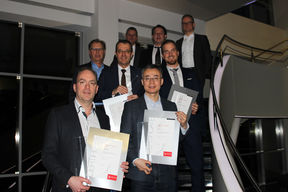Anton Paar Research Award to Robin Ras and Quan Zhou
The first Anton Paar Research Award for Instrumental Analytics & Characterization has been granted to the team of Professors Robin Ras and Quan Zhou for their invention on Scanning Droplet Adhesion Microscopy (SDAM).

The award-winning measurement technique allows locally resolved measurement of the wettability of surfaces. It has been developed to understand and characterize the wetting properties of liquid-repellent materials. The award was presented to them on 7th February 2019.
The prize money of 20,000 Euro was divided between two inventions that are outstanding both scientifically and in their metrological implementation. The other winners are Johannes Waclawek and Bernhard Lendl from the Technical University of Vienna. A total of 69 applications from 19 countries were submitted for Anton Paar's first research prize.
Read more news

‘Mesoscale’ swimmers could pave way for drug delivery robots inside the body
Researchers have discovered how tiny organisms break the laws of physics to swim faster — such secrets of mesoscale physics and fluid dynamics can offer entirely new pathways for engineering and medicine.
Design strengthens industrial competitiveness – human-centered factory work at the core
Factory work is undergoing a transformation: new technologies and artificial intelligence are changing the content and roles of work. Aalto University’s Department of Design is studying this change from a human-centered perspective in the HiFive project.
The proxy server for remote access to e-resources is changing
If you have problems using e-resources, try accessing the e-resource using VPN connection.






